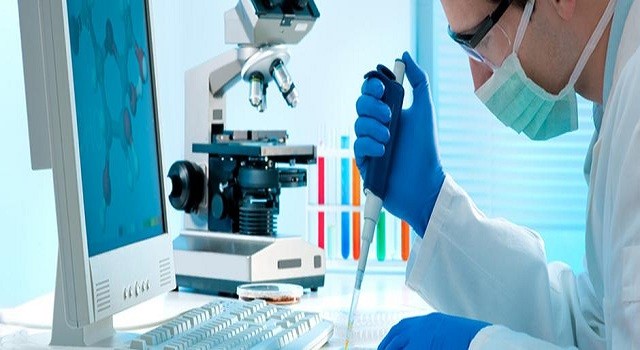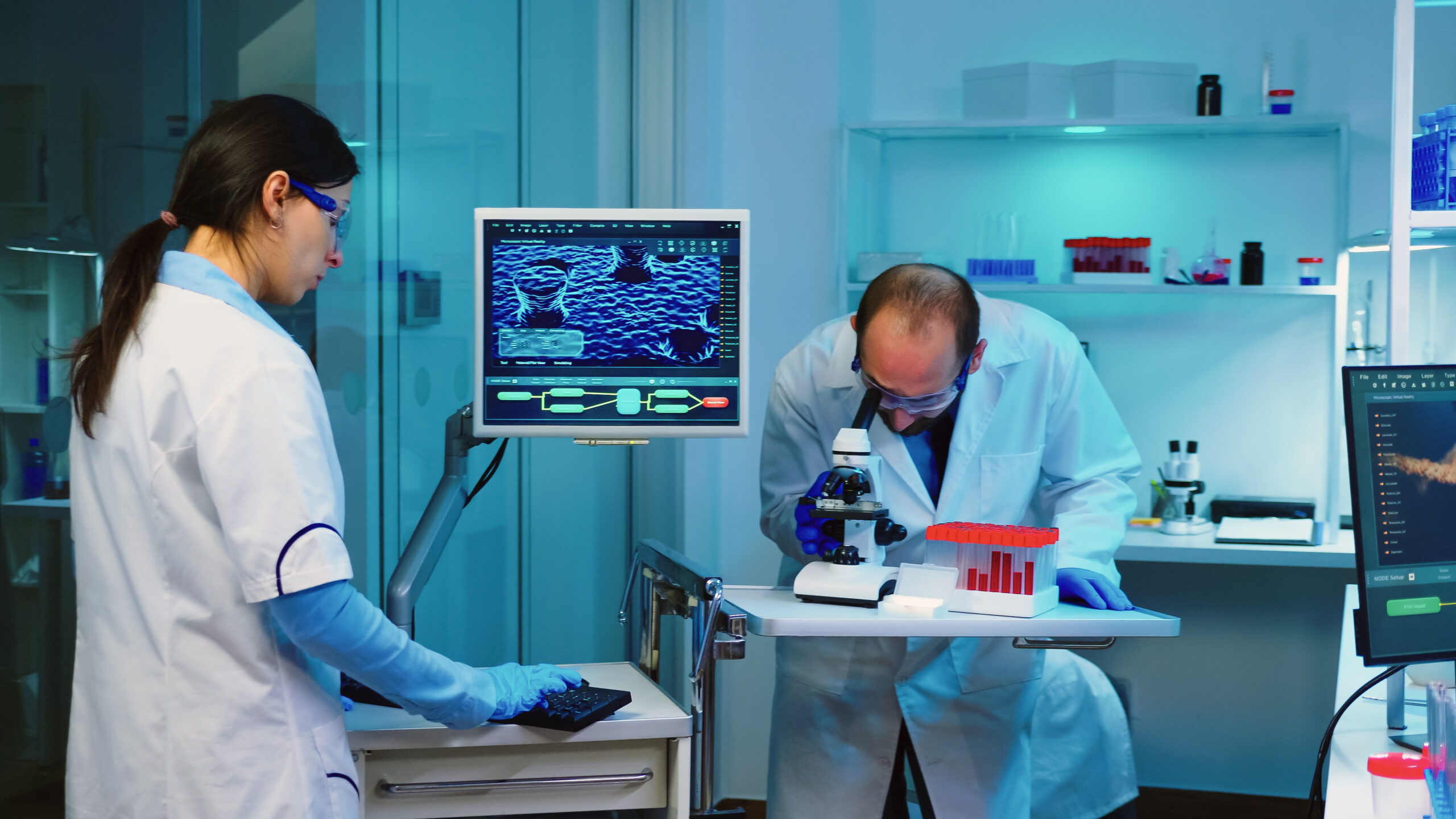The Europe laboratory informatics market is on an upward trajectory, driven by the increasing need for efficient data management and integration in laboratories. The market reached a valuation of approximately USD 1017.69 million in 2023 and is projected to grow at a Compound Annual Growth Rate (CAGR) of 8.1% from 2024 to 2032, potentially reaching a value of USD 2003.63 million by 2032. The growing adoption of digital technologies and the need for streamlined processes in laboratories, particularly in pharmaceuticals, biotechnology, and healthcare, are major factors propelling this growth.
Introduction to the Europe Laboratory Informatics Market
Laboratory informatics refers to the integration of software, hardware, and data management systems designed to manage and analyse laboratory data. These technologies provide real-time information to ensure that scientific research is executed with greater precision, efficiency, and in compliance with regulatory standards. The adoption of laboratory informatics solutions in Europe is being driven by the growing demand for automation, data management, and improved operational efficiency across a variety of sectors, including pharmaceuticals, healthcare, biotechnology, and research.
In the context of the European market, laboratory informatics covers a broad range of software solutions, such as Laboratory Information Management Systems (LIMS), Electronic Lab Notebooks (ELNs), and scientific data management platforms. These technologies enable laboratories to optimise operations, improve data accuracy, ensure compliance with regulations, and reduce human error.
Key Drivers of the Laboratory Informatics Market in Europe
1. Increasing Demand for Automation
The laboratory informatics market is largely driven by the need for automation in laboratory processes. Laboratories across Europe are increasingly turning to automation to reduce the time and cost of manual testing. Automation also reduces human error and ensures more reliable and consistent results. These systems automate various functions, such as sample tracking, data recording, and analysis, resulting in more streamlined laboratory operations.
2. Growing Adoption of Cloud-based Solutions
The adoption of cloud-based laboratory informatics solutions is gaining momentum in Europe. Cloud technology enables laboratories to store large amounts of data in a secure and easily accessible manner. It also facilitates collaboration among research teams across different locations, which is crucial for multinational companies. The use of cloud solutions reduces IT infrastructure costs, allows for remote access, and provides scalability to meet evolving laboratory needs.
3. Demand for Data Compliance and Regulatory Standards
Laboratories in Europe must comply with strict regulations, particularly in the pharmaceutical and biotechnology sectors. Laboratory informatics solutions help laboratories ensure compliance with regulations such as Good Laboratory Practice (GLP), Good Manufacturing Practice (GMP), and ISO standards. These systems maintain data integrity, audit trails, and version control, which are crucial for ensuring that laboratory processes meet regulatory standards.
4. Advancements in Scientific Research
With the continuous advancements in scientific research, particularly in genomics, proteomics, and drug discovery, laboratories require robust informatics solutions to handle and analyse vast amounts of data. The increasing complexity of data generated by these studies is driving the need for more sophisticated laboratory informatics solutions that can handle big data and advanced analytics.
Get a Free Sample Report with Table of Contents: https://www.expertmarketresearch.com/reports/europe-laboratory-informatics-market/requestsample
Market Segmentation of the Europe Laboratory Informatics Market
1. By Type of Software
- Laboratory Information Management Systems (LIMS): LIMS is a critical component of laboratory informatics, as it helps manage the data and workflow of laboratory operations. LIMS helps in sample tracking, data analysis, and inventory management. The growing demand for laboratory automation and data integrity drives the LIMS market.
- Electronic Lab Notebooks (ELNs): ELNs are increasingly being adopted by researchers to replace traditional paper-based lab notebooks. These digital tools provide secure and efficient methods for recording and sharing research data. The trend toward digital transformation in research institutions and companies is boosting the adoption of ELNs.
- Scientific Data Management Systems (SDMS): SDMS helps laboratories manage and analyse complex scientific data. These systems are widely used in research-intensive industries, particularly pharmaceuticals and biotechnology.
2. By End User
- Pharmaceutical and Biotechnology Companies: Pharmaceutical and biotech companies are the largest consumers of laboratory informatics solutions in Europe. These industries require laboratory informatics to streamline research, ensure compliance, and improve data accuracy.
- Contract Research Organizations (CROs): CROs are increasingly adopting laboratory informatics solutions to optimise their research processes and deliver results in a timely and cost-effective manner.
- Academic and Research Institutes: Research institutions are investing heavily in laboratory informatics solutions to support advanced research, particularly in fields like genomics and molecular biology.
3. By Deployment Type
- On-premises: On-premises solutions are installed and maintained in the laboratory’s physical location. These solutions provide greater control over data security and infrastructure but often come with higher upfront costs.
- Cloud-based: Cloud-based solutions offer flexibility, scalability, and cost-effectiveness. With cloud deployment, laboratories can access data remotely and store large amounts of data securely. Cloud-based laboratory informatics solutions are growing in popularity across Europe due to their ease of access and low maintenance costs.
4. By Geography
- Western Europe: Countries such as Germany, the UK, and France dominate the market in Western Europe due to their robust pharmaceutical and biotechnology industries.
- Northern Europe: Countries like Sweden and Denmark are also investing in laboratory informatics due to their growing research sectors and the presence of leading research institutions.
- Southern Europe: The demand for laboratory informatics is also increasing in Southern European countries, particularly in Italy and Spain, as they modernise their healthcare and research infrastructure.
Trends Influencing the Market
1. Artificial Intelligence and Machine Learning Integration
The integration of AI and machine learning with laboratory informatics systems is transforming the way laboratories manage and analyse data. AI can help identify patterns in complex datasets, improve predictive analysis, and enhance decision-making processes. As AI becomes more sophisticated, it is expected to play a larger role in laboratory informatics.
2. The Rise of Personalized Medicine
Personalized medicine requires the integration of vast amounts of patient data, including genetic and clinical data. Laboratory informatics systems are crucial for managing this data and providing actionable insights for researchers and clinicians. The rise of personalized medicine is, therefore, expected to drive demand for more advanced laboratory informatics solutions.
3. Increasing Focus on Data Security
As laboratories handle sensitive patient data and intellectual property, ensuring data security is a top priority. Laboratory informatics solutions are increasingly focusing on providing robust security features to protect data from cyber threats and breaches. Compliance with GDPR (General Data Protection Regulation) and other data privacy laws is a major driver of this trend in Europe.
Challenges in the Europe Laboratory Informatics Market
Despite the strong growth trajectory, the laboratory informatics market in Europe faces several challenges. The high initial investment and complexity of implementing new systems can be a barrier for small and medium-sized enterprises (SMEs). Additionally, some laboratories are reluctant to adopt new technologies due to concerns over data privacy and the integration of informatics systems with legacy systems.
Key Players in the Europe Laboratory Informatics Market
Several leading players in the laboratory informatics market are contributing to the market’s growth by offering innovative solutions and expanding their presence in Europe. Some of the key players include:
- Thermo Fisher Scientific Inc.
- Thermo Fisher Scientific is a global leader in laboratory instruments and informatics solutions, offering a wide range of LIMS, ELNs, and SDMS solutions.
- LabWare Inc.
- LabWare provides laboratory informatics solutions, including LIMS, ELNs, and mobile applications, helping laboratories streamline operations and improve efficiency.
- PerkinElmer Inc.
- PerkinElmer offers software and services to the life sciences and healthcare sectors, including laboratory informatics platforms for data management and analysis.
- Agilent Technologies Inc.
- Agilent Technologies provides laboratory solutions for various industries, including pharmaceuticals, biotechnology, and healthcare, with a focus on data management and laboratory efficiency.
- Dassault Systèmes
- Dassault Systèmes offers laboratory informatics solutions with advanced data management, simulation, and analytics capabilities, primarily focused on the life sciences sector.
- Waters Corporation
- Waters Corporation provides laboratory informatics software for data analysis, reporting, and quality control, specialising in the pharmaceutical and biotechnology sectors.
- Accelerated Technology Laboratories, Inc.
- Accelerated Technology Laboratories focuses on providing LIMS and laboratory automation solutions to a variety of industries, including environmental testing and healthcare.
FAQs on the Europe Laboratory Informatics Market
1. What is laboratory informatics?
Laboratory informatics refers to the integration of software, hardware, and data management systems designed to manage, analyse, and store laboratory data efficiently. It includes systems like LIMS, ELNs, and SDMS.
2. How fast is the laboratory informatics market growing in Europe?
The laboratory informatics market in Europe is growing at a CAGR of 8.1%, with an expected market value of USD 2003.63 million by 2032.
3. What factors are driving the growth of laboratory informatics in Europe?
The growth is driven by increasing automation, the adoption of cloud-based solutions, the need for regulatory compliance, and advancements in scientific research.
4. Who are the major players in the Europe laboratory informatics market?
Key players include Thermo Fisher Scientific Inc., LabWare Inc., PerkinElmer Inc., Agilent Technologies Inc., and Dassault Systèmes.
5. What are the challenges in adopting laboratory informatics?
Challenges include high initial investment costs, concerns over data privacy, and the complexity of integrating new systems with existing laboratory infrastructure.
Related Trending Reports
https://www.expertmarketresearch.com/reports/orthopaedic-soft-tissue-repair-market
https://www.expertmarketresearch.com/reports/cleanroom-technology-market
https://www.expertmarketresearch.com/reports/vaccine-storage-equipment-market



